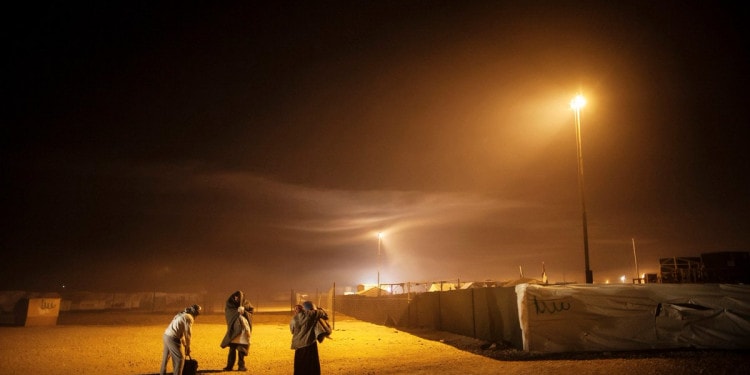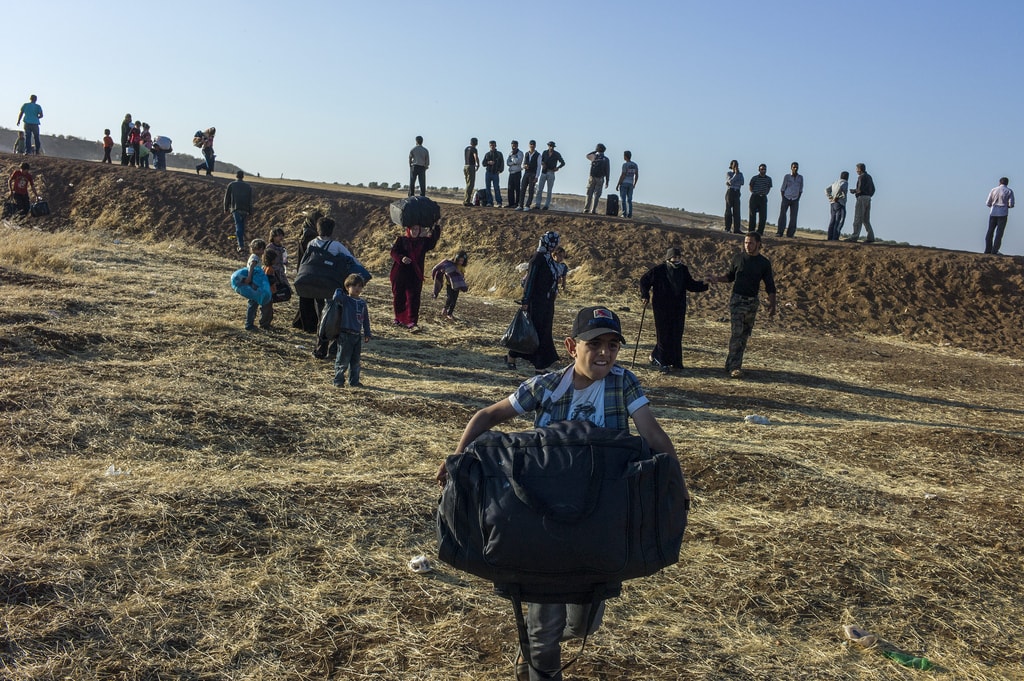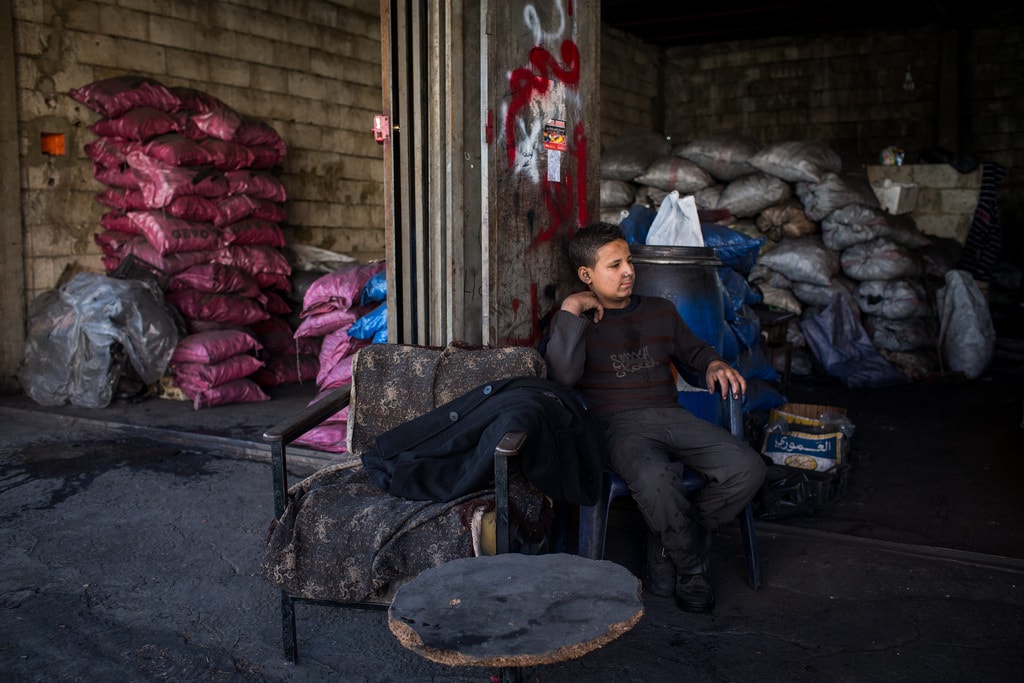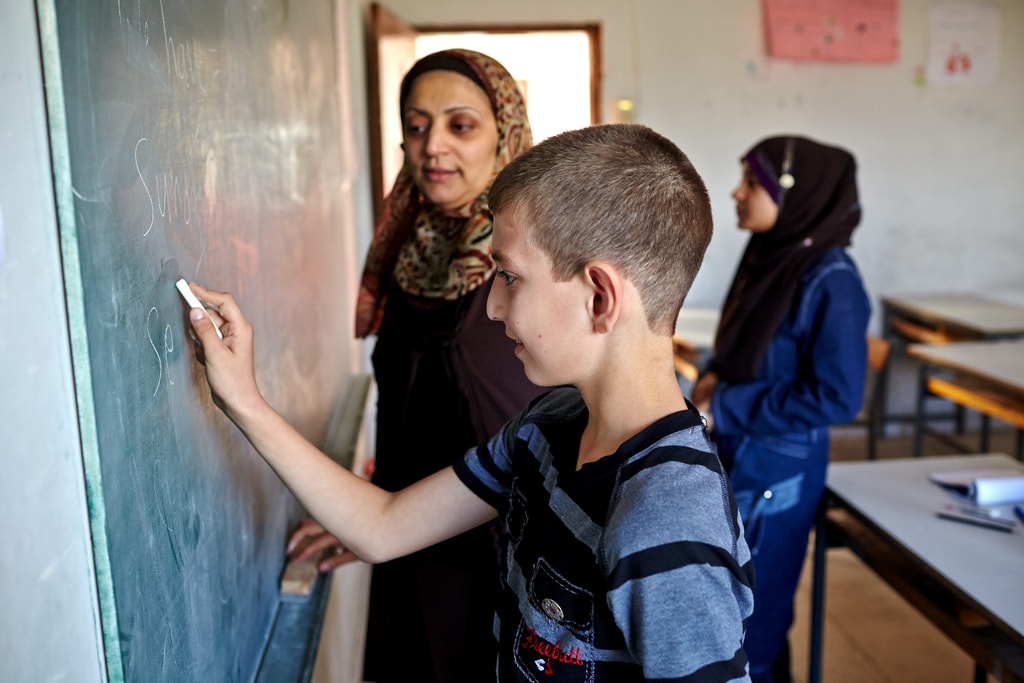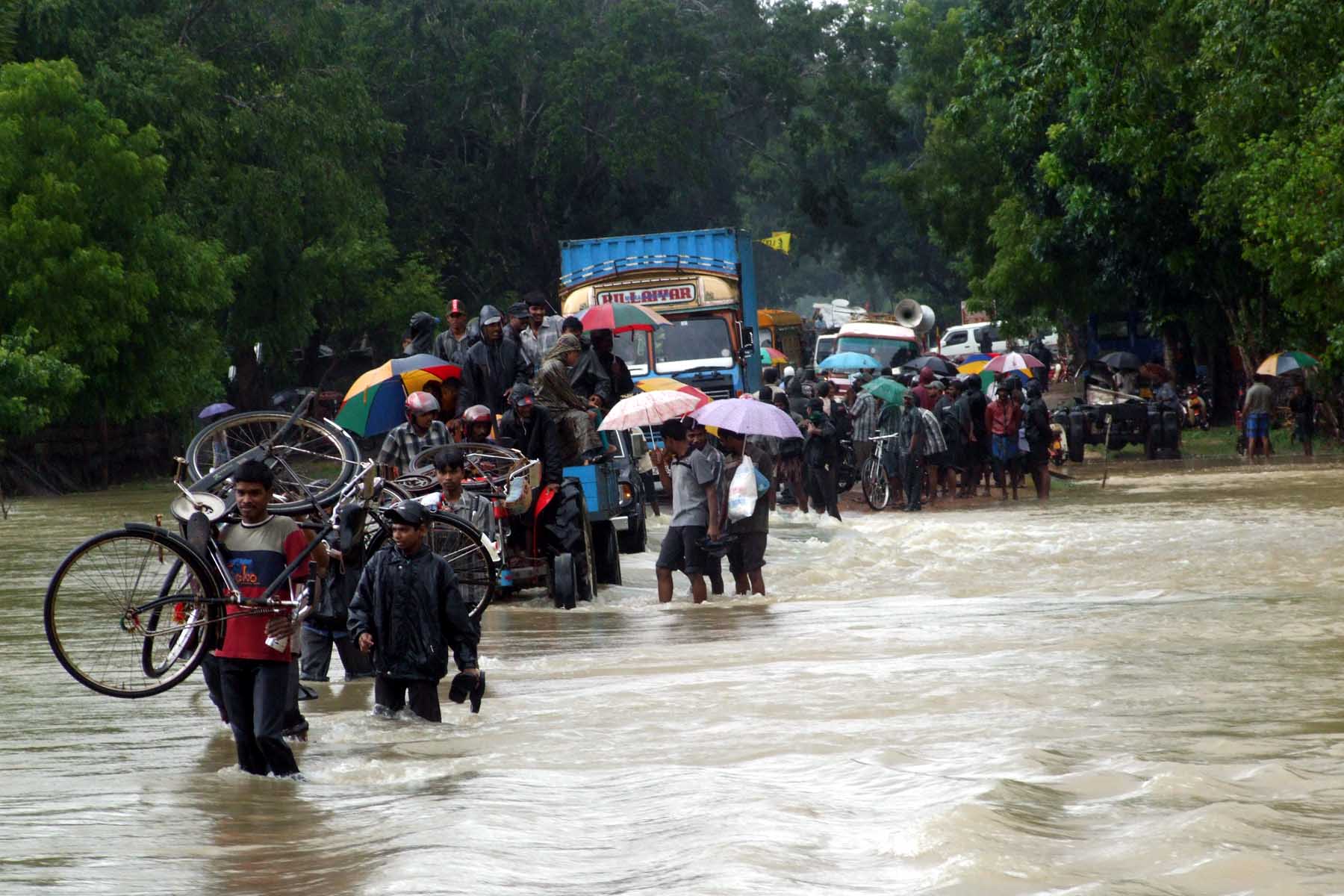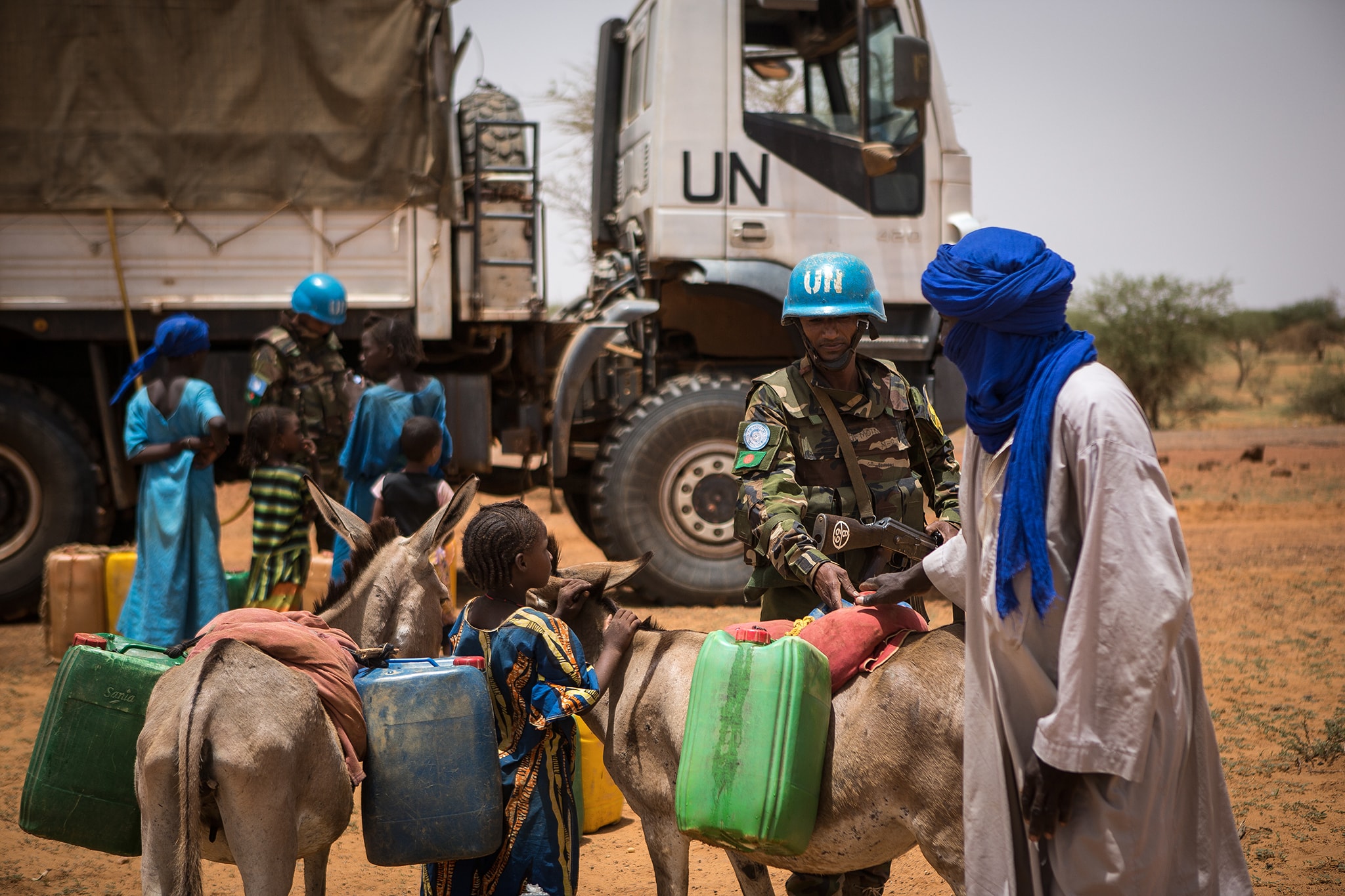The Syrian crisis evokes images of refugee camps or those who take on the harsh challenges to cross into Europe. Perceptions about the victims of this war seem to be homogeneous. These refugees are poor. They need to be rescued. This is thanks to the advocacy efforts of humanitarians playing a leading role in the response to the largest humanitarian catastrophe after the World War II. However, this crisis has thrown in multiple challenges. Indeed, the challenges like food, shelter, and medical assistance are visible and demand immediate attention. But others, like those of educated, aspirational Syrians trapped in a vicious cycle of underemployment, unfortunately, remain invisible, evading attention.
In the photo: Life on the run: A Syrian boy, followed by his family, runs with his bag in his hands, moments after crossing the border into Jordan. The moment he crossed the border this boy became a refugee. Credits: UNHCR/O.Laban-Mattei/June 2013
Mazen is one of the ‘invisible’ casualties of the Syrian crisis we met in a shop during our field research interviews in Lebanon. A handsome twenty-something Syrian, he speaks perfect English. He studied communications at Damascus University for three years. Imagine a life mapped out with hopeful personal milestones until a war brings untold changes to the lives of most middle-class Syrians.
The reason for his exodus is not a military attack on his town. With the war came a conflict economy and a currency depreciation. With the economic opportunities diminishing in Syria, he had to look for work outside. In Lebanon, he is working two shifts in a job which promises no upward mobility. At the same time, Mazen sees no incentives in seeking the vocational training offered by many NGOs on the ground, because of his family’s dependence on his remittances. A nagging sense of incompetence which comes from not having finished his education adds to his misery. His fears, common to this society at large, that his lack of credentials will not allow him to utilize his education in a structured professional path continue to haunt him.
Like Mazen, an estimated half million Syrians in Lebanon do not fit the archetype image of a refugee which has come to flood the common conscience of people the world over. Some of these Syrians become inadvertent breadwinners to several members of their family, forced to take up jobs which are not commensurate with their skills or educational experiences, while seeing their pre-war aspirations slowly wither away.
Often perceptions of pre-war social status stop them from registering as refugees. They choose to remain unregistered, preferring to continue to be invisible, avoiding images of refugees for themselves which are circulated in popular media while working odd jobs to fend familial bankruptcy.
A majority of Syrians in Lebanon work in construction and agriculture. But the argument that foreign human resources are poorly educated is a misconception. During our field interviews, we met men and women who bring significant work experiences and even open businesses, but they struggle with institutional challenges, raids, the absence of banking services and access to markets.
Resilience, one of the most popular buzzwords in the development aid community in today’s world, comes not from survival, but from a sense of self-worth derived from valuable employment. If we find solutions for this invisible group, we will also provide immediate economic dividends to the adopted nation or build capacities in people which will be on the forefront of rebuilding Syria.
We asked Mazen why he does not take up online freelancing in translation or transcribing as an alternative income generation opportunity. Acknowledging the challenging legal environment in Lebanon for newcomers, it is logical, we thought, that this option would be explored by Syrians.
However, our research revealed more complex challenges in designing employment programs for refugees.
First and foremost, the crisis-affected community has risk-averse behaviors, choosing stability over opportunity. One educated young man working in the construction site responded that if he forgoes this sweatshop job, or even asks a few days off, there will be a line of others, ready to take it. In such a vicious cycle, the vast majority of working Syrians would not be able to take any educational or vocational training opportunities that will allow them to upgrade their skills. Does that mean that vocational programs designed even with a stipend would not be an option for this group of people?
In the photo: The Charcoal Boys: Child Labour in Lebanon. Abdullah, 15, takes a break at the charcoal shop where he works in Bebnine, Lebanon. Abdullah is from Homs and has lived in Lebanon for more than six months with his father and 11 siblings. He used to work in a welder’s workshop but prefers the charcoal shop and his boss there, who is like a second father to him. Credits: UNHCR / A. McConnell / January 2014
Secondly, in this community, online work is perceived as an inadequate employment option due to a cultural stereotype of what a good job needs to be. While the advanced economies experience a boom in on-demand workforce and gig economy is growing exponentially across all sectors, it is a very new concept for the countries in the Middle East and requires additional programming with the elements of behavior change.
Thirdly, freelance does not come as easy to the people trapped in working in inadequate jobs for years, having an incomplete education. Independent work comes with a sense of self-efficacy built over years of working and practicing your craft.
Lastly, those educated Syrians, often unregistered with the authorities, also deprived themselves of the opportunity to open a bank account while mobile wallets, such as PayPal, are largely unavailable in Lebanon. None of our interviewees had a bank account opened in their names.
These realities bring new challenges that we, development professionals, should focus on when deciding to explore programs focused on employment of refugees. We need to innovate and search for alternative solutions, and acknowledge that continuous advocacy to give work permits or open more sectors of the economy to refugees has not been very successful.
In the photo: Syrian refugee Jamal El Hadda, 12, writes on a chalk board beside his teacher Miss Abir Sbai on his first day back at school after many months of displacement and absence. Photo Credit: UNHCR
For countries, such as Lebanon, where the country’s small economy is compounded by regional issues of mass youth unemployment, online work for foreign companies – outsourcing or offshoring – is the best option so far.
The crisis also results in social challenges, with the poorer members of the host community and unemployment disproportionately affecting youth in Lebanon. The quicksand that grips both refugees and host communities is not just a humanitarian crisis, it is a developmental one as well.
With humanitarian need continually growing, we need to design new innovative programs that target the aspirational and educated youth – both Lebanese and Syrians, building their capacity and creating structured avenues to allow them to find professional and entrepreneurial opportunities. The fruits of such labor could trickle down to the most vulnerable sections of society in the form of further hiring and investment. Given the next looming challenge is to rebuild both nations, a population which will be at the forefront of such a demanding task should be immediately supported, even before the rebuilding mission is upon them.


